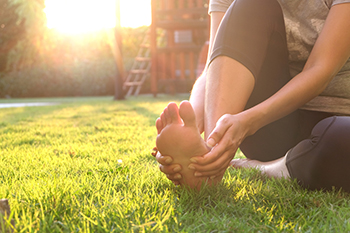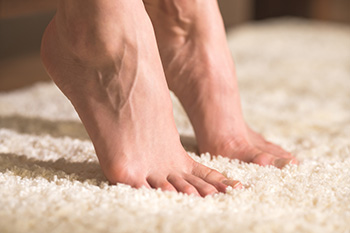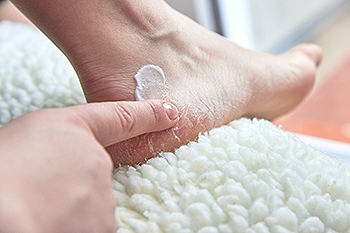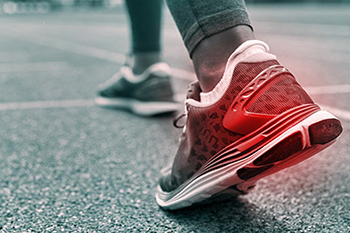NJ (908) 688-5577
NY (212) 737-2528

Our feet provide us with the mobility to walk, run, and complete daily tasks. It is important to take proper steps in taking care of our feet, and this may help in preventing foot pain. Despite this information, research has indicated that approximately one out of three people who are over 65 years old will have foot pain. Heel pain is common, and may be a sign of plantar fasciitis. This can happen when the plantar fascia becomes inflamed from wearing shoes that do not fit correctly. Athlete’s foot can be uncomfortable and unsightly. This can develop from a fungal infection, and it may be prevented by wearing appropriate shoes while frequenting public swimming pools and locker rooms. A pain or ache in the back of the leg may indicate an Achilles tendon injury has developed, and it may come from increasing speed or distance too quickly while running. Any type of foot pain can wreak havoc on the day’s activities, and it is advised that you speak to a podiatrist who can determine what the cause is and treat your foot pain accordingly.
Foot Pain
Foot pain can be extremely painful and debilitating. If you have a foot pain, consult with Glenn Davison, DPM from Advanced Podiatry. Our doctor will assess your condition and provide you with quality foot and ankle treatment.
Causes
Foot pain is a very broad condition that could be caused by one or more ailments. The most common include:
Diagnosis
To figure out the cause of foot pain, podiatrists utilize several different methods. This can range from simple visual inspections and sensation tests to X-rays and MRI scans. Prior medical history, family medical history, and any recent physical traumatic events will all be taken into consideration for a proper diagnosis.
Treatment
Treatment depends upon the cause of the foot pain. Whether it is resting, staying off the foot, or having surgery; podiatrists have a number of treatment options available for foot pain.
If you have any questions, please feel free to contact our offices located in Union, NJ and New York . We offer the newest diagnostic and treatment technologies for all your foot care needs.

The feet take us wherever we want to go, all day, every day. But the feet are often neglected when it comes to caring for them. For many people, getting a pedicure is the extent of their foot care routine. However, if your feet are not also strong and healthy, the rest of your body can pay the price. A foot problem or disorder may affect the way you walk and that may cause pain in your knees, hip, back, and neck. Furthermore, other conditions may develop in the feet, such as bunions, plantar fasciitis, and arthritis. Painful feet may cause you to avoid movement and exercise, which reduces the strength of the feet, and increases the risk of falling. One of the best ways to take care of your feet is by wearing shoes that provide the correct balance of flexibility and support. Shoes that are too stiff may put the ankles at risk. Another way to practice foot fitness is by doing simple strength and mobility exercises on a regular basis. Among these are toe lifts, rolling your foot over a ball, and scrunching a towel or blanket with the toes. For more information on how to best take care of your feet, please consult a podiatrist.
Everyday foot care is very important to prevent infection and other foot ailments. If you need your feet checked, contact Glenn Davison, DPM from Advanced Podiatry. Our doctor can provide the care you need to keep you pain-free and on your feet.
Everyday Foot Care
Often, people take care of their bodies, face and hair more so than they do for their feet. But the feet are a very important aspect of our bodies, and one that we should pay more attention to. Without our feet, we would not be able to perform most daily tasks.
It is best to check your feet regularly to make sure there are no new bruises or cuts that you may not have noticed before. For dry feet, moisturizer can easily be a remedy and can be applied as often as necessary to the affected areas. Wearing shoes that fit well can also help you maintain good foot health, as well as making it easier to walk and do daily activities without the stress or pain of ill-fitting shoes, high heels, or even flip flops. Wearing clean socks with closed shoes is important to ensure that sweat and bacteria do not accumulate within the shoe. Clean socks help to prevent Athlete’s foot, fungi problems, bad odors, and can absorb sweat.
If you have any questions please feel free to contact our offices located in Union, NJ and New York . We offer the newest diagnostic and treatment technologies for all your foot and ankle needs.

Cracked heels are a common occurrence. Heels can become cracked from dry skin brought on by bathing for too long in water that is too hot, using harsh cleansers, not moisturizing enough, and having poor circulation. Foot problems can take longer to heal, and it is harder to keep feet free of infections. It is important for everyone, but especially diabetics, to check their feet regularly, wash, dry, and moisturize them daily, avoid going barefoot, trim toenails properly and carefully, and wear well-fitting shoes. If you have cracked heels that are not responding to routine foot care along with having diabetes as a complication, it is suggested you see a podiatrist for an evaluation and a treatment plan.
If the skin on your feet starts to crack, you may want to see a podiatrist to find treatment. If you have any concerns, contact Glenn Davison, DPM from Advanced Podiatry. Our doctor can provide the care you need to keep you pain-free and on your feet.
Cracked Heels
It is important to moisturize your cracked heels in order to prevent pain, bleeding, and infection. The reason cracked heels form is because the skin on the foot is too dry to support the immense pressure placed on them. When the foot expands, the dry skin on the foot begins to split.
Ways to Help Heal Them
Ways to Prevent Cracked Heels
If you are unsure how to proceed in treating cracked heels, seek guidance from a podiatrist. Your doctor will help you with any questions or information you may need.
If you have any questions, please feel free to contact our offices located in Union, NJ and New York . We offer the newest diagnostic and treatment technologies for all your foot care needs.

There are several different types of running shoes, and it can be a daunting task to choose which kind is right for you. It is important to identify the running preferences in addition to the type of surfaces that will be run on, such as trails or pavement. Trail shoes are known to provide traction in the snow and mud, and can help to protect the feet against rocks and rugged terrain. Additionally, trail shoes are sturdier, which can successfully support the foot as it moves from side to side. Conversely, road shoes are ideal for running on treadmills and smooth pavements. People who compete in track meets often opt for track spikes or racing flats. These shoes are helpful in gripping the surface in various types of weather, and are considered to be the lightest running shoe. If you have questions about what type of running shoes are best for you, please consult with a podiatrist who can address any concerns you may have.
If you are a runner, wearing the right running shoe is essential. For more information, contact Glenn Davison, DPM from Advanced Podiatry. Our doctor can provide the care you need to keep you pain-free and on your feet.
Choosing the Right Running Shoe for Your Foot Type
To increase performance and avoid the risk of injury, it is important to choose the right running shoe based on your foot type. The general design of running shoes revolves around pronation, which is how the ankle rolls from outside to inside when the foot strikes the ground.
If you have any questions please feel free to contact our offices located in Union, NJ and New York . We offer the newest diagnostic and treatment technologies for all your foot and ankle needs.